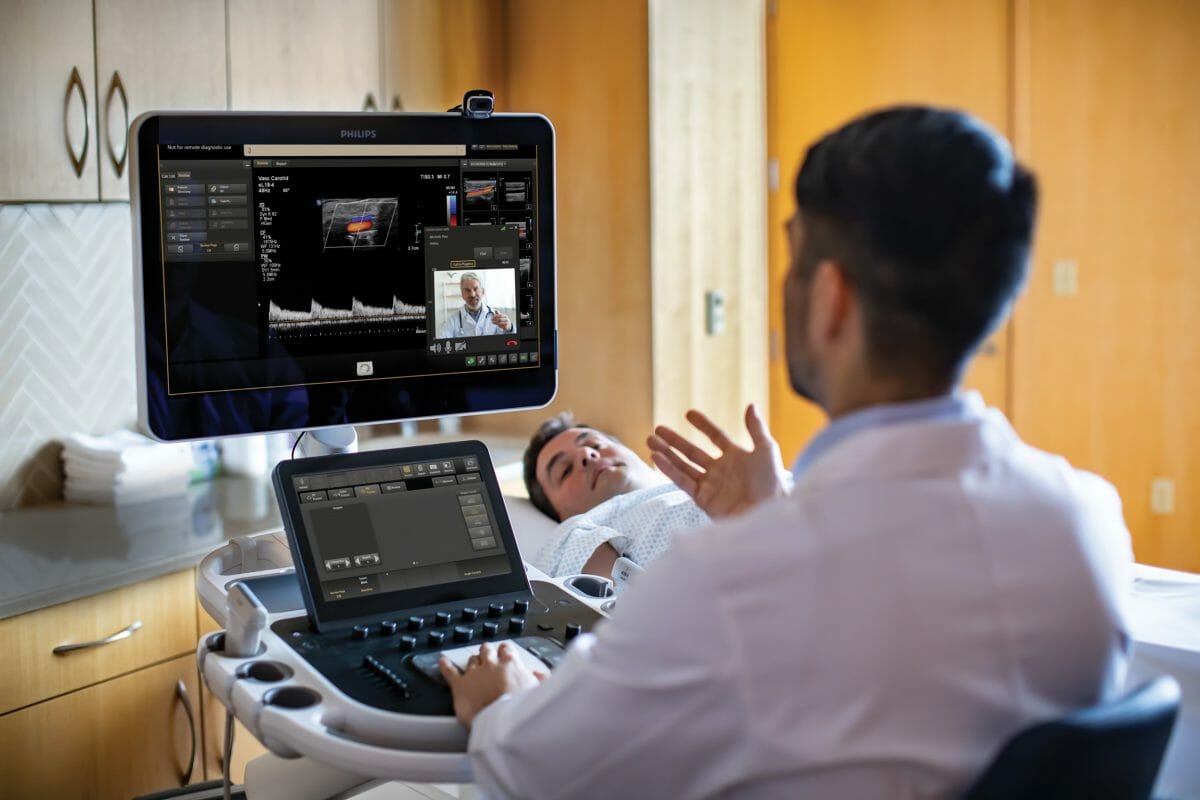Royal Philips (NYSE: PHG, AEX: PHIA), a global leader in health technology, today announced its portfolio of smart diagnostic systems and transformative workflow solutions featured at the Radiological Society of North America (RSNA) annual meeting (November 27 – December 1, Chicago, USA). Powered by AI, the company will showcase its latest systems and informatics solutions designed for providers to efficiently deliver patient-centric, high-quality imaging services.
Overwhelming volume of radiology data compounding staff shortages and burnout
Radiology plays a critical role in diagnosing and guiding patients into the right treatment plans. However, with increasing staff shortages and workloads, radiologists and staff continue to struggle to manage and interpret the huge volume of data captured to provide quality care for each patient. In the recent Future Health Index 2022 report commissioned by Philips, 24% of radiology leaders surveyed stated that managing the sheer volume of data available to them is their top data-related issue, with nearly two-thirds (65%) indicating their staff are overwhelmed by data overload.
“With 47% of radiologists experiencing burnout [1], our customers are looking for innovations to help reduce their workloads and seamlessly integrate into their day-to-day operations,” said Kees Wesdorp, Chief Business Leader of Precision Diagnosis at Philips. “With smart intelligence built into imaging systems and informatics across the radiology workflow, Philips’ integrated solutions condense large volumes of data into patient-centric actionable insights for earlier and more definitive diagnosis and treatment.”
AI-powered solutions enhance operational efficiencies and simplify complex workflows
Some of the biggest challenges facing radiology leaders today are driven by managing complex, disconnected workflows which can negatively impact patient care, staff experience, outcomes, and cost. Visitors to the Philips booth (6730) at RSNA will see how the company’s latest interoperable and vendor-neutral operational solutions and strong portfolio of smart connected imaging systems help streamline and transform the radiology workflow to improve patient and staff experience; advance clinical and diagnostic confidence for better health outcomes; and drive a sustainable, resilient diagnostic infrastructure to help lower the cost of care. Featured at RSNA will be Philips’ AI-enabled technology [2] that automates and accelerates routine and repetitive tasks to generate patient-centric insights from large volumes of data to help improve productivity.
Solutions include Philips Imaging Orchestrator – ROCC (Radiology Operations Command Center) and Philips Ultrasound Collaboration Live, both pioneering the virtualization of radiology, extending care and collaboration beyond traditional models. Philips Imaging Orchestrator – ROCC, a vendor-neutral, multi-modality, multi-site telepresence solution provides advanced tele-acquisition capabilities and seamlessly connects imaging experts at a command center with technologists at scanning locations across an organization. Philips Ultrasound Collaboration Live tele-ultrasound, available on Philips ultrasound systems – EPIQ Elite and Affiniti – allows teams to securely video stream from their ultrasound system to a PC or mobile device for remote, on-demand access to clinical expertise regardless of location.
Philips will also introduce the latest in AI-enabled image interpretation to help prioritize patient worklists based on clinical outcomes and expand diagnostic capabilities with its new Philips Advanced Visualization Workspace, with enhanced features to automate reporting and help drive earlier and more definitive diagnosis. Also featured is Philips Enterprise Performance Analytics – PerformanceBridge – to enhance operational decision-making through a vendor-neutral, real-time data analysis solution to help improve productivity and reduce costs.
Smart connected imaging systems advance clinical and diagnostic confidence
New at RSNA, Philips’ AI-powered MR SmartSpeed is designed to increase speed, image quality, and productivity and drive diagnostic confidence with improved image resolution via the AI reconstruction algorithm. It utilizes Philips’ state-of-the-art speed engine and an award-winning [3] AI reconstruction technology delivered at the source of the MR signal to ensure no data loss. SmartSpeed joins the company’s expanding portfolio of AI-driven MR solutions which includes AI-based touchless patient sensing, SmartExam, and MR Workspace. Philips will also showcase MR 5300, Philips’ newest BlueSeal Magnet, and industry-first wide bore helium-free operations system design for sustainable imaging at lower site costs without image quality or clinical compromises.
Philips will spotlight its award-winning Spectral CT 7500, the company’s latest dual-detector CT system helping radiologists better characterize disease and reduce scan times at the same dose levels as conventional scans. Used in oncology imaging, cardiac imaging, and interventional radiology, the system has demonstrated a 34% reduction in time to diagnosis, a 25% reduction in repeat scans and a 30% reduction in follow-up scans [4]. Philips will also demonstrate its latest innovations in minimally-invasive care with the company’s SmartCT 3D suite of interventional tools including its Azurion 7 C20 with FlexArm Image-Guided Therapy System and Zenition 70 Mobile C-arm with Flat Detector.
Philips will also introduce the Ultrasound Compact 5000 Series system and the Philips Lumify Handheld Ultrasound, now featuring pulse wave Doppler for all physicians – from cardiologists and radiologists to emergency care – to quickly assess hemodynamics in cardiac function anytime, anywhere. Also making its first appearance at RSNA is Philips Fluoroscopy 7000 N – ProxiDiagnost N90, combining digital radiography and high-end nearby fluoroscopy to help enhance clinical confidence and improve patient and staff satisfaction.
Future fit portfolio for Radiology
Underpinning each of these innovations is Philips’ commitment to deliver solutions that support a sustainable, resilient diagnostic infrastructure to help hospitals receive ongoing value from their investments. An integrated suite of innovative service models and smart digital solutions helps maximize the lifespan and capabilities of Philips’ systems, bringing more value to healthcare providers, while increasing circularity, and demonstrated by leading technology like Philips helium-free MRI system, Philips MR – Ingenia Ambition 1.5T, which includes the industry’s first and only fully-sealed magnet technology, BlueSeal.
Philips corporate symposia sessions at RSNA
Philips will host two symposia sessions during RSNA. On Monday, November 28 at 7:00 – 8:00am CST, Kees Wesdorp will facilitate a panel session during a virtual symposium to discuss “Decarbonizing radiology: a shared mandate,” featuring leading experts from around the world discussing mandates for sustainable, responsible radiology best practices. On Tuesday, November 29 at 9:30am CST, Niccolò Stefani, Head of Clinical Strategy at Philips, will facilitate a live, in-person discussion with radiology leaders from across the globe on how they are leveraging digital technology to manage the growing workforce shortages and increased imaging demands.
Visit Philips at RSNA 2022 to learn more about the company’s latest smart integrated diagnostic systems and connected workflows helping to advance precision diagnosis and treatment. Join Philips in person at booth #6730 at RSNA, or virtually via the Philips interactive online radiology experience and follow @PhilipsLiveFrom for #RSNA22 updates throughout the event.
[1] Medscape radiologist lifestyle, happiness and burnout report, 2022, published Feb. 18, 2022
[2] Philips embraces the following formal definition of AI from the EU High-Level Expert Group (source: HLEG definition AI)
[3] Adaptive-C-SENSE-Net technology is the winner of the FastMRI Challenge hosted by Facebook AI Research and NYU Langone Health.
[4] Analysis by CARTI Cancer Center in Little Rock Arkansas and University Hospitals of Cleveland – Results from case studies are not predictive of results in other cases. Results in other cases may vary.


